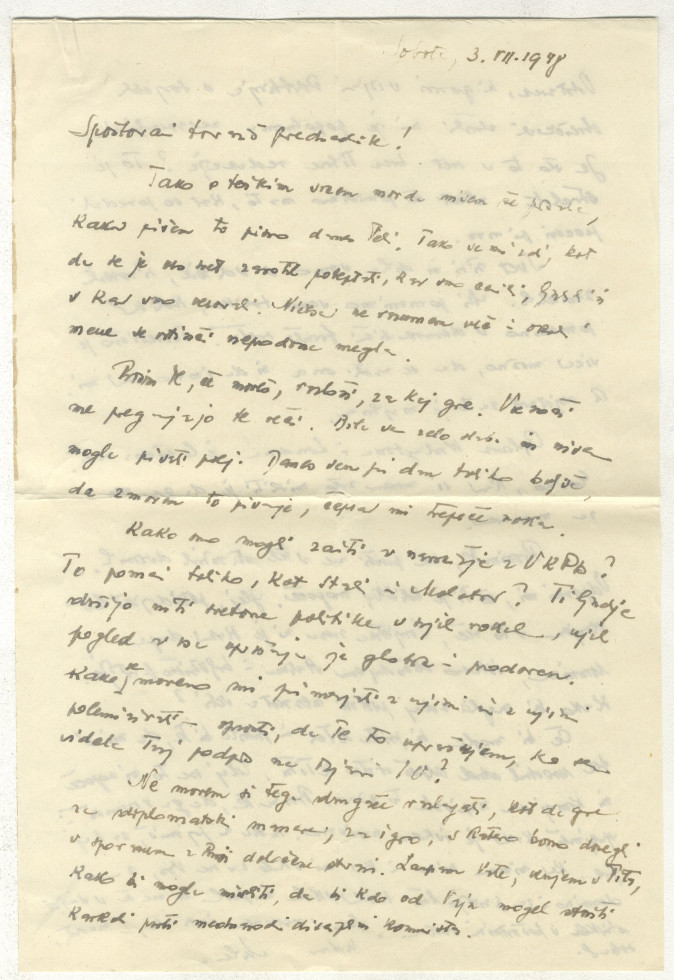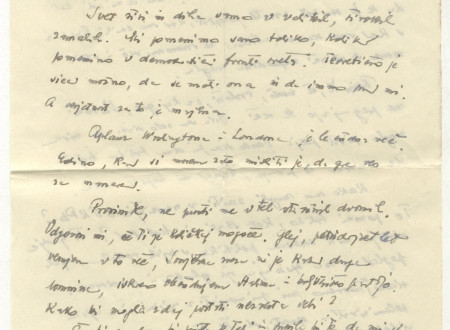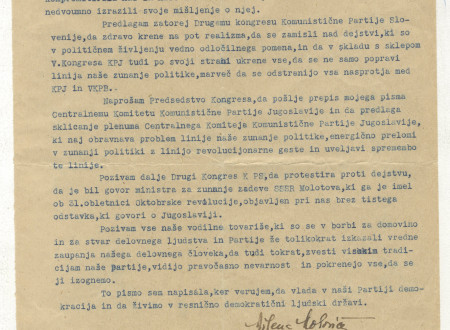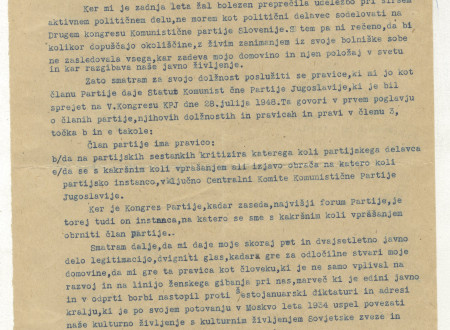Cominform Conflict – When White Suddenly Becomes Black
Letters Written by Milena Mohorič to the President Miha Marinko and to the 2nd Congress of the Communist Party of Slovenia
At its meeting in Bucharest on June 28, 1948, Cominform (Communist Information Bureau), led by the Communist Party of the Soviet Union, adopted the so-called “Resolution Concerning the Communist Party of Yugoslavia”, accusing the Yugoslav communists of revisionism and engagement in Western imperialism. The resolution was an open call for a general campaign against Yugoslavia. To this day, Cominform conflict is still considered an important turning point in the political history of post-war Yugoslavia. From then on, Yugoslav socialism gradually began to take a different shape than the one implemented in the Soviet Union, but decisions taken by the Yugoslav communist leadership immediately after the conflict were not entirely straight. While on the one hand a number of measures was being taken to prove their loyalty to Stalin (such as collectivization of farming and homogenization of the People’s Front), they still vehemently denied the accusations and ruthlessly persecuted Soviet sympathizers, the so-called Cominformists, who overnight became Yugoslavia’s internal enemies. Many people began to have serious doubt as to the justification of Yugoslav resistance, forcing Yugoslav authorities to take revenge on real or alleged Cominformists. Initially, purges were carried out within the military, the police and among the Party members, but were gradually extended over society as a whole. Numerous arrests took place in Slovenia at the start of 1949, immediately after the session of the politburo of the Communist Party of Slovenia (CPS) on January 13, 1949, when it became clear that the dispute with the former ally was final. First arrests were made among intellectuals and students, and a number of workers and state officials were expelled from the Party due to their real or alleged pro-Cominform attitude. Most of them were sent to prison, or were forced to do community service. According to the 1958 data of the Central Committee of the CPS, 2275 people were interrogated about their Cominform involvement, and 731 of them were imprisoned.
Presented here are two letters written by Milena Mohorič to the Prime Minister of the People’s Republic of Slovenia Miha Marinko and to the 2nd Congress of the Communist Party of Slovenia. The story of a Germanist, a female poet and a writer Milena Mohorič, married name Premru (1905-1972), gives evidence of just how profoundly political systems can affect a life of an individual.
Milena Mohorič was born into a middle class family in Ormož. Her father dr. Fran Mohorič was a judge in Ormož and in Ljubljana and a private assistant professor at the Faculty of Law in Zagreb. As a writer, Milena Mohorič was a master of short prose, exploring in particular the women’s question. She married Vladimir Premru (1902-1949), a chemist, a poet and a communist, whose field of expertize was cancer treatment. They had a son Lev Premru (1931-2005), a chemist and a pharmacist, who in the 1980s was the manager of the pharmaceutical company Lek. Cominform conflict had a devastating effect on the entire Premru family.
In 1934, Milena Mohorič – although a member of the CPS only since 1942 – travelled to Moscow, where she saw “the results of the historical break on the spot”. For her, this was not “an affair”, but rather “a question of life”, as she depicted it in her autobiography of a Party member. In 1941, she became a member of the Association of the Friends of the Soviet Union. The following year she was arrested by Italian authorities for her involvement with the People’s Front; she spent the following months in the concentration camp on the island of Rab and later in Visco near Palmanova. In 1944, she joined the partisans, where among other tasks she was also the acting chief for the field of education at the Slovene National Liberation Council.
After the war, she was a lecturer at the Faculty of Education in Ljubljana. Soon, the revolution, which she lived and breathed for and for which she sacrificed a lot, turned into a monster that was eating its own children before her very eyes. First, her husband Vladimir was arrested and interrogated in connection with the first Dachau trial, because he had been a prisoner at the Dachau concentration camp, and in addition to that he was also a chemist, employed as the chief of a department at the Ministry of Industry and Mining in Ljubljana. He was suspected of collaborating with secret Nazi police at the concentration camp, but was not convicted at Dachau trials due to lack of evidence. The Party, however, did not forget about him. He was soon imprisoned in connection with another pathologic story – as Cominformist. He was sent to Goli otok prison, where he died in 1949. Cominform hunt did not even spare their son Lev, who at the time was a student at a classical grammar school in Ljubljana. He was sentenced to 8 years of close arrest in Bileća and on Goli otok, but was pardoned after four years.
Initially, Milena Mohorič viewed the conflict with the Soviet Union with disbelief, which then turned into a horror of a revolutionary, whose world just collapsed. In her letter of July 3, 1948 to the Prime Minister Miha Marinko she wrote: “It seems to me like the whole world decided to trample on everything we cherished, we loved and believed in. I no longer understand anything and I am shrouded in a thick blanket of fog.” She wrote: “How did we manage to come into conflict with the All-Union Communist Party (Bolsheviks)? Does that means as much as Stalin and Molotov? These people hold the strings of world politics in their hands, their insight into all questions is deep – piercing.” With a touch of political pragmatism she added as well: “The world lives and breathes in large, wide swings. We are valued only as much as we are valued in a democratic front of the world. Theoretically there is a chance that the world front is wrong and we are right, but this probability is very small.” Later, on November 9, 1948, she wrote a letter to the 2nd Congress of the CPS, the highest ranking forum of the Party, which took place between November 11 and 15 in Ljubljana. She was critical, especially towards the issue of Yugoslav foreign policy to the Soviet Union and socialist countries, and demanded: “The content and the form of our foreign policy need to be revised. Its present state compromised us and our protectors and forced them to clearly express their opinion of it.”
Milena Mohorič was interrogated and her physical deterioration was followed by deterioration of her mental health. She was constantly relocated – from her home to prison, from prison to psychiatric hospital, then back to prison and to the facility of the literary society in Bled. She lost her home and was because of her political conviction completely isolated. On March15, 1949, the City Committee of the CPS supported the proposal of the University Committee to expel Milena Mohorič from the Party on the basis of her being a supporter of Cominform resolution and also because in one of her letters she talked about her possible visit to Moscow where she would try and sort out the Yugoslav situation with Stalin. On October 25, 1958, the Ljubljana District Committee of the League of Communists of Slovenia made a decision to delete her from the list of Cominformists on account of her mental illness, since “according to doctors her illness was incurable and she will never leave the hospital”. And that is exactly what happened.
Mojca Tušar





